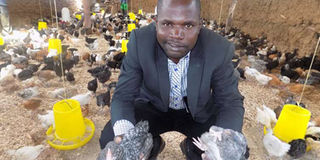I run my 6,000 chicks farm from simple mud houses

Wakoli Jeneri in one of the coops on his chicken farm in Bungoma. Wakoli's chicken coops are mud-walled, a characteristic which has many benefits both financially to him, and for the welfare of the poultry residing in them. PHOTO | RACHEL KIBUI | NATION MEDIA GROUP
What you need to know:
- The mud helps keep the birds warmer, thus cut expenses, while the mud structures demonstrate to the community that one does not need a huge capital to venture into commercial chicken farming.
- Record-keeping is vital as it helps farmers on monitoring income and expenses as well as other vital records.
- Besides selling chicks, Jeneri, 33, also imports poultry equipment from China and Turkey like incubators and chicken cages.
As one enters Wakoli Jeneri’s home in Khachonge, Kanduyi in Bungoma County, the eyes first set on three mud-walled structures.
Having been constructed with mud, the structures look unimpressive, but they make Jeneri’s Engokho Farm, and he built them for strategic reasons.
“I weighed my options, between wood and mud, which one was good for my chicks and cheaper, and settled for the latter. The advice I got was that the mud would help me keep the birds warmer, thus cut my expenses,” says the farmer, adding that he also built the mud structures to demonstrate to the community that one does not need a huge capital to venture into commercial chicken farming.
Jeneri, an electrical engineer, has specialised in rearing chicks that he sells at day-old at Sh85 and a month-old at Sh180 each.
“I get eggs from Kalro, Kakamega at Sh1,000 a tray though I keep about 300 chickens that also give me eggs for hatching in my two incubators, which have a total capacity of 18,000 eggs,” says Wakoli, who works in Nairobi at the Kenya Industrial Research and Development Institute.
On the farm, he has six employees who take care of his 6,000 to 12,000 chicks he hatches in a month.
He has sponsored two of them to undertake electric courses at the nearby Kisiwa Youth Polytechnic in a bid to ensure they handle the incubators professionally.
“Once the chicks are hatched, I vaccinate them against Marek’s disease, Newcastle at 20 and 30 days and gumboro at 10 days. The chicks stay in the brooder where I use gas heater to keep them warm,” he says, noting his main customers are organisations that support farmers, county governments and individual farmers.
Besides selling chicks, Jeneri, 33, also imports poultry equipment from China and Turkey like incubators and chicken cages.
His background in engineering, he says, helps him in sourcing good equipment for himself as well as his clients.
WARMER AND CHEAPER
“A good incubator should be spacious for good air circulation, have an appropriate sized fan and controller and actual readings should be equal. I sell the incubators from Sh20,000 to Sh500,000 while cages go for Sh35,000. The prices are inclusive of transport and installation,” says Jeneri, who invested about Sh1 million when starting the business in 2012.

Inside one of the coops in Wakoli's chicken farming venture in Bungoma County. PHOTO | RACHEL KIBUI | NATION MEDIA GROUP
Jeneri, who travels every week from Nairobi to keep tabs on his poultry business, also holds training sessions for farmers in collaboration with experts from Kalro.
“The training lasts a day and a farmer pays Sh200 in exchange of the lessons and a one-month-old chick. Those who cannot afford work for a half-day in exchange of a chick,” says Jeneri, who gets farmers from Trans Nzoia, Webuye, Malaba and Lugari, some who visit to see the incubators for the first time.
Claris Sifuna, a farmer, says he started poultry farming with a chick he was offered by Jeneri early last year and his business has now grown that he sells at least 20 chickens every month.
Dr Githui Kaba, a veterinary officer in Nakuru, says chicken houses do not necessarily have to be complicated.
“While mud-walled structures are warmer and cheaper, not everyone may choose them, especially in urban farming. I cannot insist on mud-walled structures as this may discourage other farmers who want to venture into this farming and cannot access the structures, but they are cheaper, convenient and warmer than timber.”
Recordkeeping, Dr Kaba adds, is vital as it helps farmers on monitoring income and expenses as well as other vital records.
“As long as you get a good manager and trained staff, your farm can run even when you are away at your daily job. The staff should be trained on things like feeding and vaccination to curb chicks’ mortality.”





